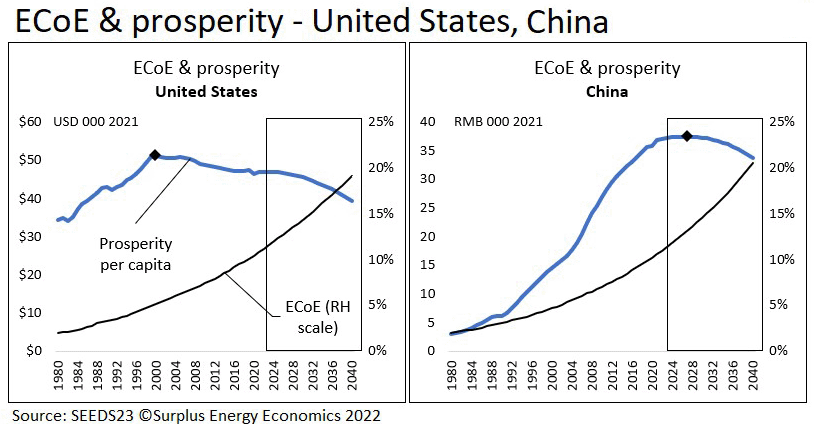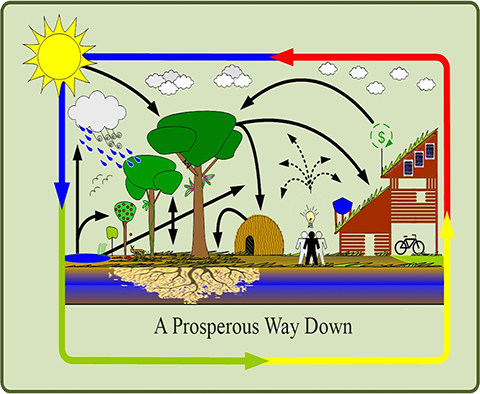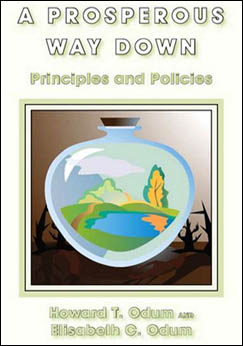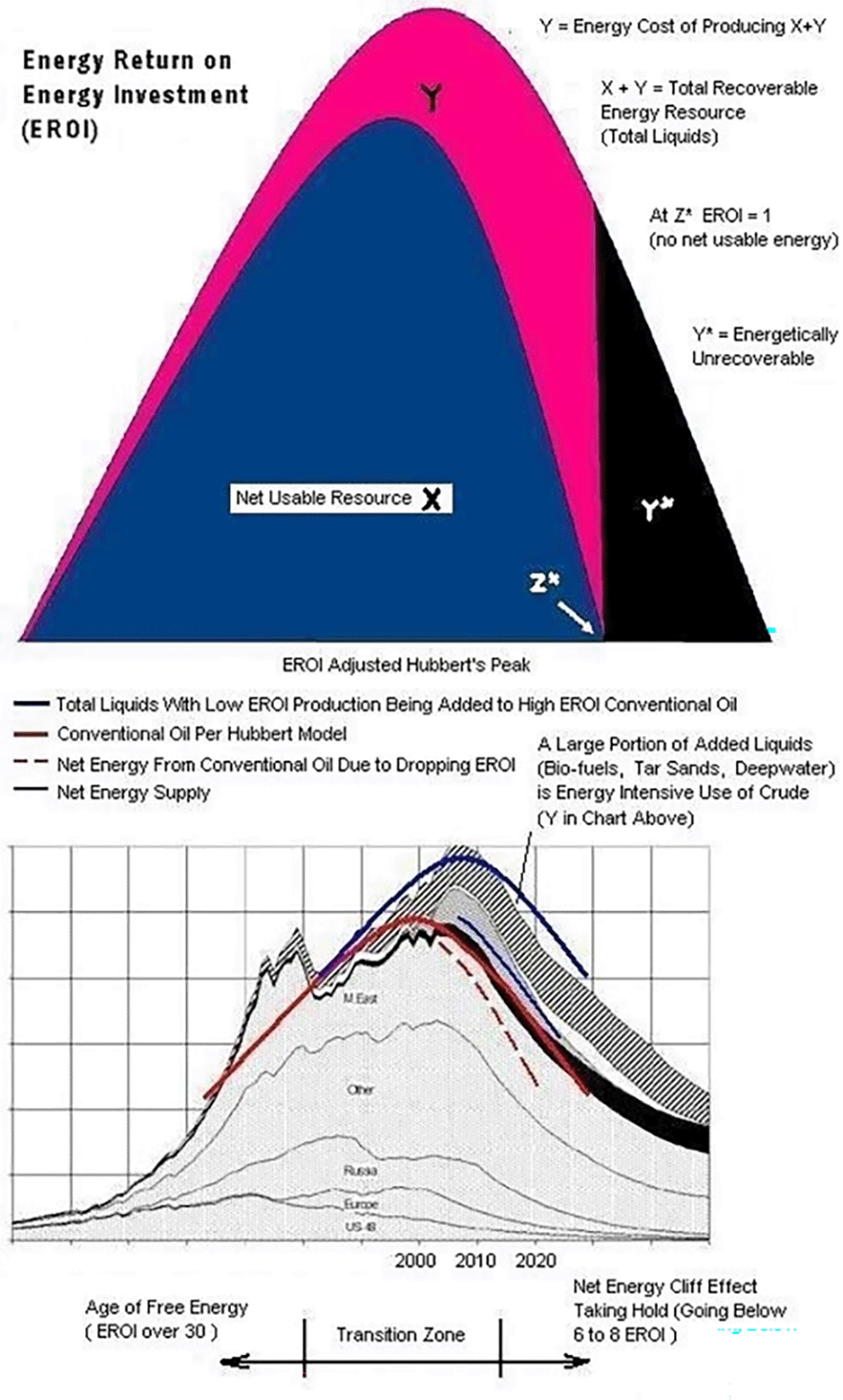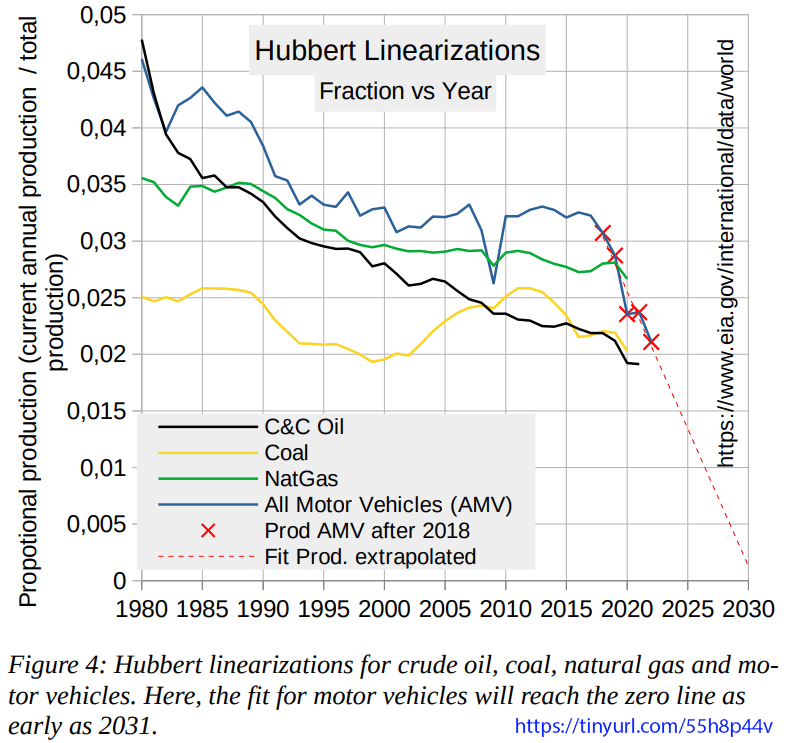
SATURDAY, JULY 25, 2015: NOTE TO FILE

The Prosperous Way Up for All
and Down for Some
Understanding the Basics
For six billion people deeply indoctrinated in the ethics of growth, a turndown and descent of civilization is unthinkable. That this descent could be prosperous is so inconceivable that it is unmentionable... . Showing a good way down is a call for everyone to think ahead and plan....for leaders to speak of a non-growth period is viewed as political suicide.... Policies based on understanding could be the difference between a soft landing and a crash. –Odum and Odum (2001)
Eric Lee, A-SOCIATED PRESS
TOPICS: SUSTAINABILITY, FROM THE WIRES, PROSPERITY, TRANSITION, HISTORY
Abstract: The Odums' vision of a prosperous way down (a book and 2005 article) is alternative to chaotic collapse as usual. However inequitable, the way up was prosperous for all who were part of the moneyed economy even if their annual income bought only a pair of shoes, a bicycle, or a soda. Those outside the Euro empire-building economy, such as all native Americans pre-conquest and most after, had their resources and lives taken, and so did not prosper, but the way up, the Euro-Sino growth hegemon, temporarily benefited those within but only in terms of material benefits, while turning the benefited into servants of an unsustainable complex society. Only those who embrace the way down, the some, are likely to prosper in the long-run.
TUCSON (A-P) — For the past 300 years increasing numbers of humans have been living in the pulse, an exuberance of growth, occasioned by the Industrial Revolution fueled by coal, oil, natural gas, and in the 20th century partly by nuclear fission and hydroelectric built using fossil fuels. With the exception of a few tribes fighting against illegal logging in their forest, all humans (to a degree proportional to monetary income) have been subsumed by the global growth economy which drives the illegal logging. Those making $1 a day aren't buying their food at the local store (or much else) and they hand wash their clothes, but they're still doing something to make a buck that profits those who make more.
In England in the 1600's the roasting process used to make charcoal from wood was adapted to coal. The result was an extremely hot-burning, relatively clean fuel (like charcoal) called coke. The use of coke in iron and steel production paved the way for the Industrial Revolution. In 1712 the steam engine was invented to pump water from coal mines and its use, along with other engines of industry, spread exponentially. By the 1730's Americans were scraping up coal off the surface of outcrops and selling it in bushel baskets. The first commercial coal mine opened in 1748 in Virginia. Americans, who still had too many trees, were still using charcoal to smelt iron until the 1830's when they also switched from whale oil to alcohol/turpentine "burning fluid" in response to peak trees and peak whales. Exponential growth is what characterizes the Industrial Revolution—the pulse we are living in.

China, and to a lesser degree India, are late comers to the pulse. It's hard to beat cheap labor, coal and plenty (for a time) of each. Note the trend in U.S. manufacturing jobs during the same period.
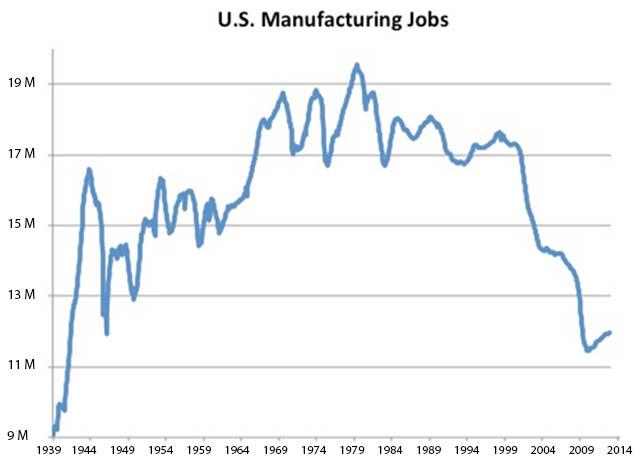
The developed world may be post-peak but consumption of cheap stuff from pre-peak China is masking, temporarily, the early signs of descent. Information is the highest value product of complex societies. Peak literacy in the Roman Empire can be viewed as its climax that was followed by descent even if most Romans failed to notice early signs of post-peak descent.
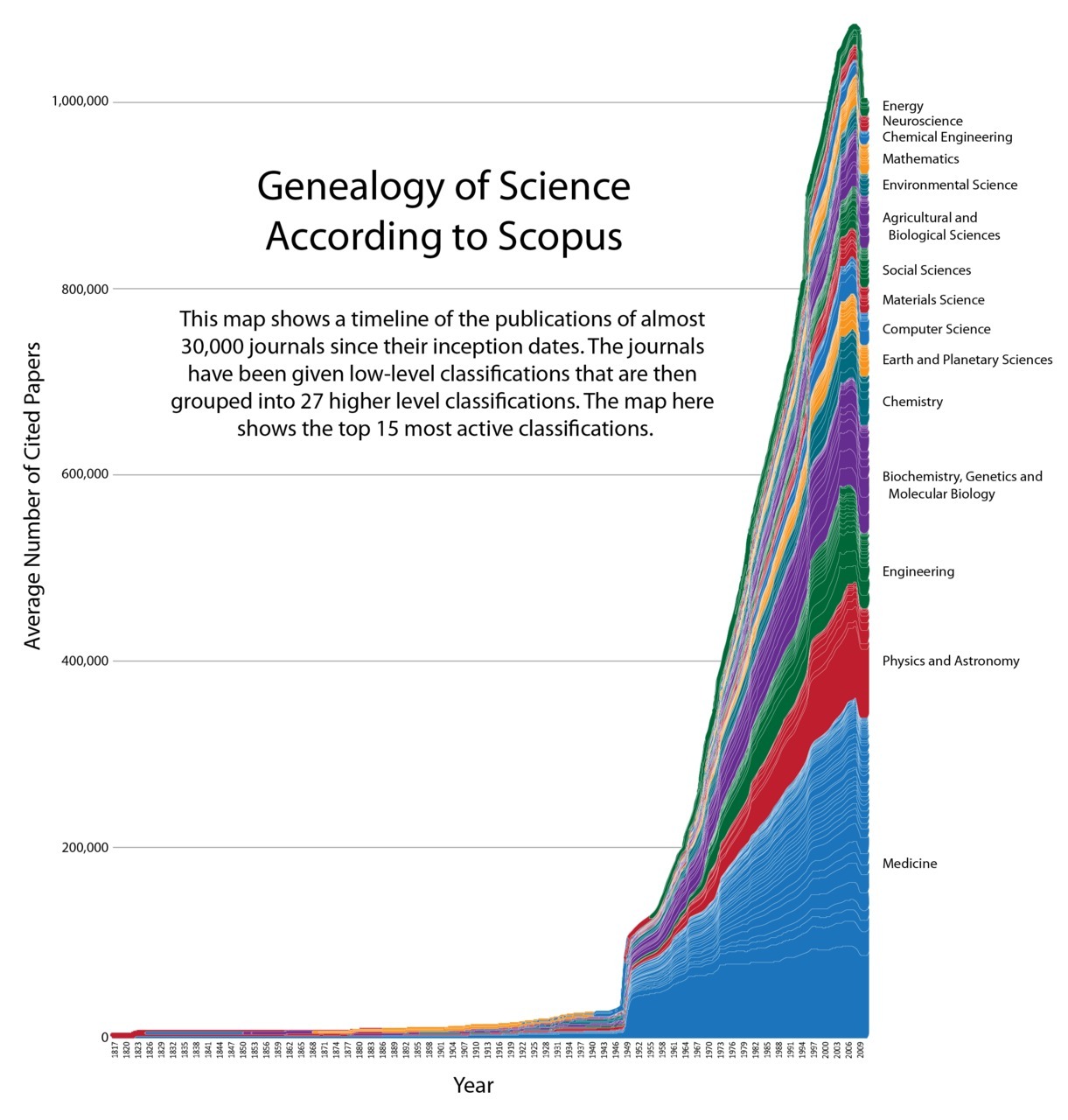
One measure of peak empire is peak population, which his not come yet. Another is peak per capita energy. Modern techno-industrial global society may have peaked in 2018, when global conventional oil production also peaked, as viewed by historians in 2118, as energy is the wealth of nations and humans who serve them. Or maybe (not likely) world energy consumption per capita will rebound and peak another year. But it will peak, and sooner is better.
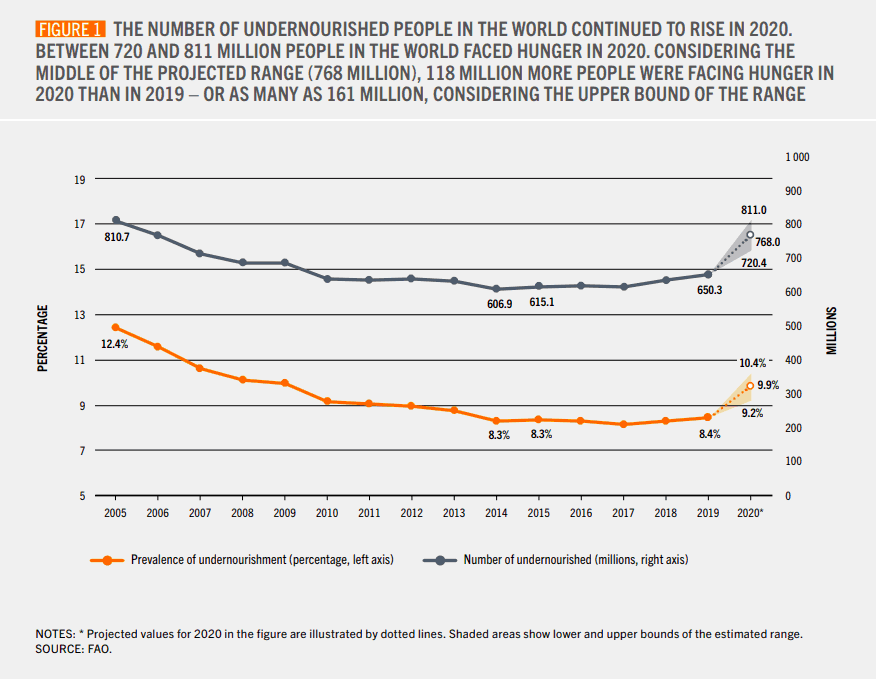
Increasing undernourishment globally is a possible measure of system climax. A more noticeable one, a clearer and less disputable one, would be peak in human population which is still growing at over 80 million per year.
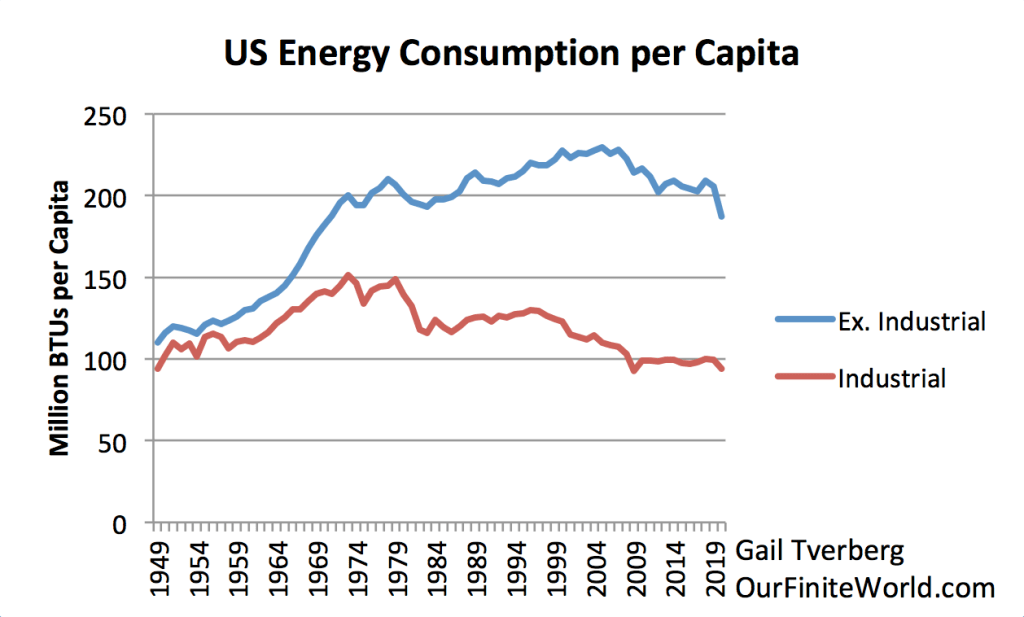
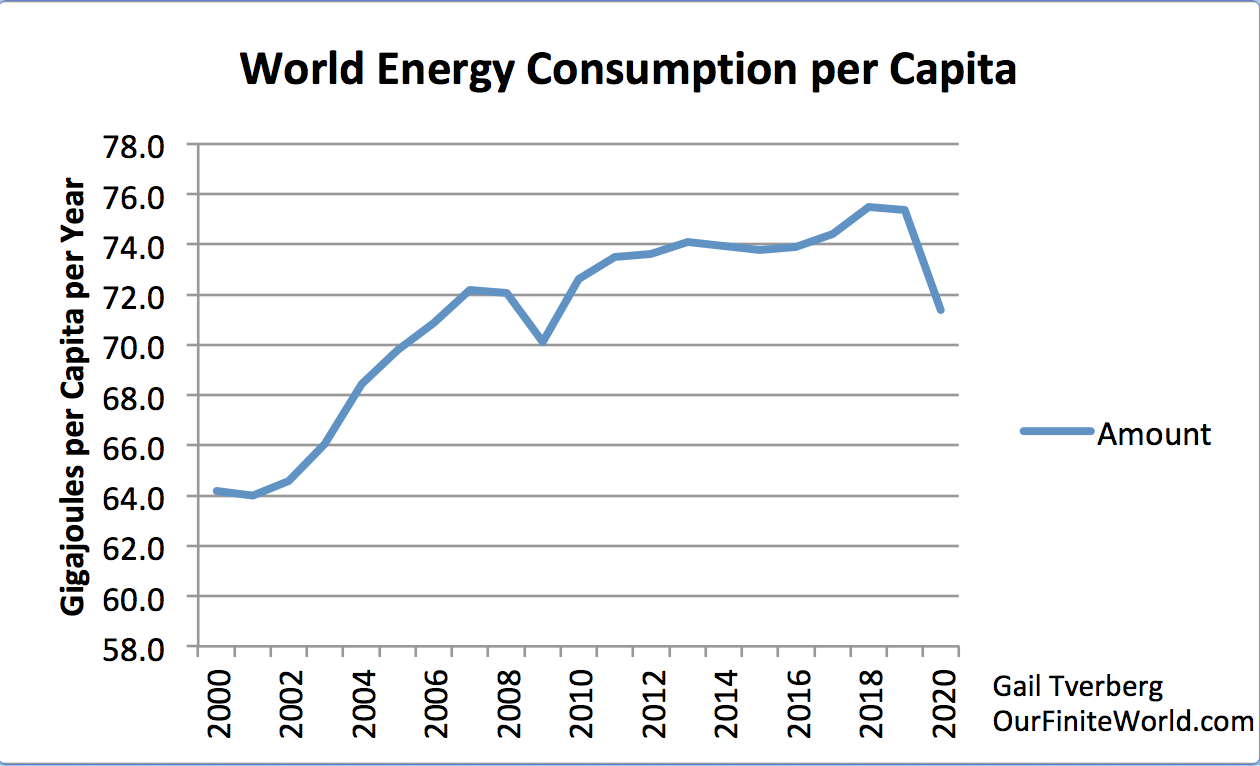
The middle class is contracting. Cheap solar and other consumer goods are fueled by cheap coal in China that makes it with help from cheap labor. The doubling of the Chinese extractive economy every 7 to 10 years is not sustainable. Consumers may still wander the aisles of Wal-Mart 24/7, so life still seems prosperous, but it cannot last.
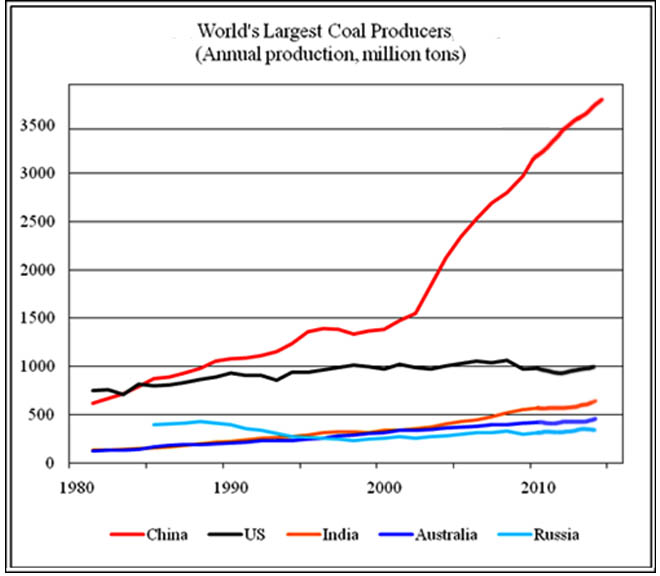
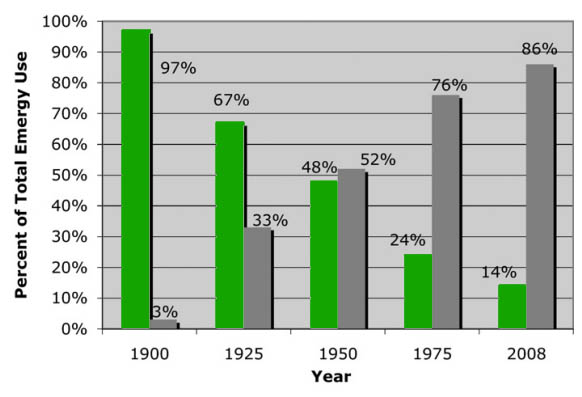 |
Emergy use of world’s economy from renewable (green) sources and non-renewable sources. M.T. Brown, S. Ulgiati 2011 |
Most of Australia's coal is exported, fueling growth in eastern Asia. China uses half of world coal production, which is why cheap is cheap. Costs are kept down by avoiding pollution control (not to mention quality control), a practice likely to continue until dead bodies pile up on the streets, which hasn't happened yet (or been reported), so it's all good (for profitable growth). When China peaks, the world will have peaked and be forced to transition, kicking and screaming like spoiled brats if that's the way the spoiled decide to play it. The growth of the Chinese economy in the 21st century looks like that of the exponential growth of the U.S. economy circa 1940. China is extracting resources from Africa, Australia, their own country, wherever they can. When China peaks, the planet will have been taken and there will be no Planet B. If there were a Planet B and it could be taken, perhaps it should not be taken.
In recent years peak petroleum has been masked from American eyes by a secondary pulse due to fracking. U.S. domestic oil production has exceed the 1970's peak. The new peak to come will still be a peak followed by descent.
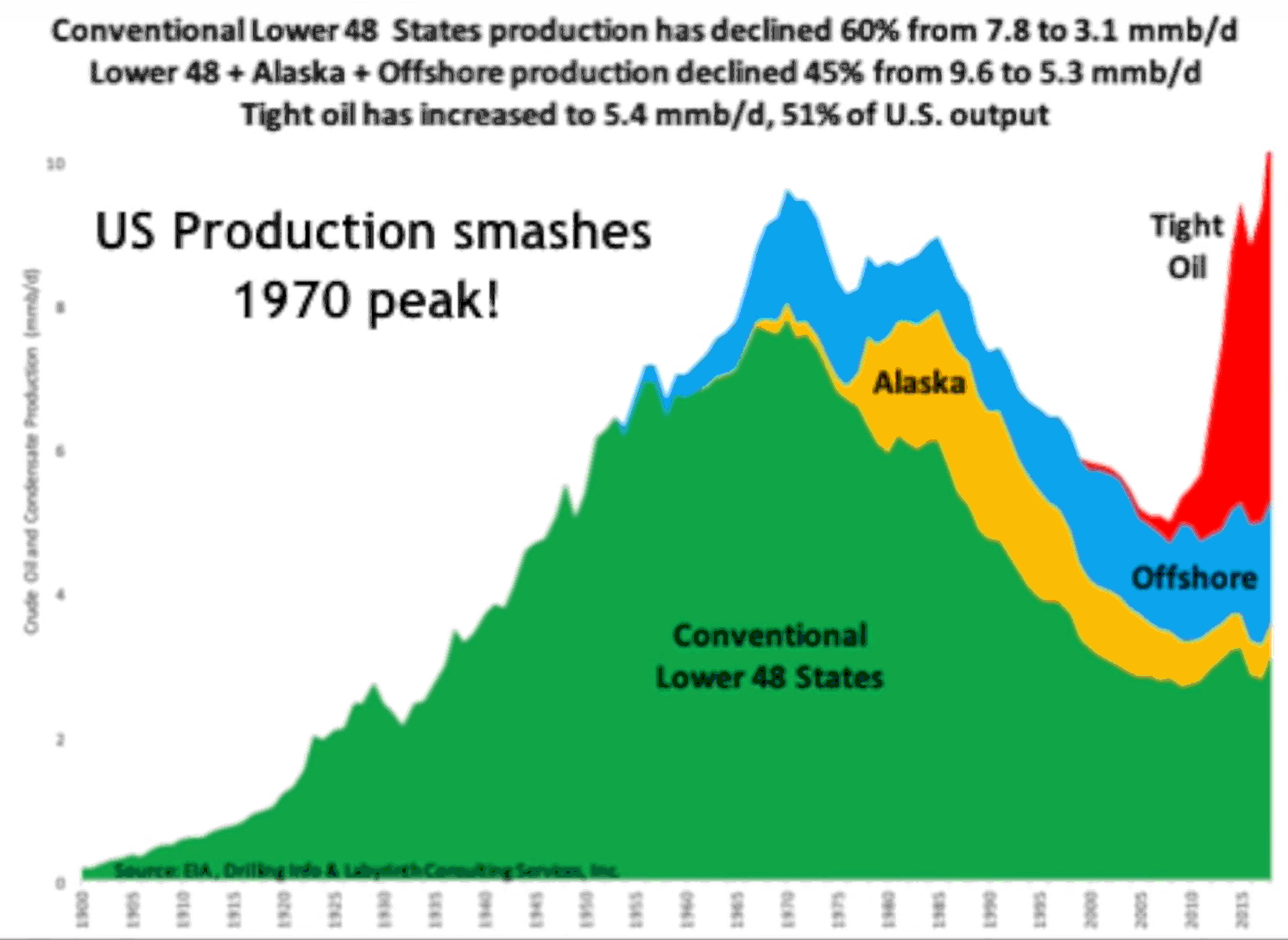
By giving Iran $150 billion for their oil to finance their jihad (their "inner spiritual struggle"), the global pulse can be extended a bit. In the not so long run of time, however, the Hubbert curve will fit.
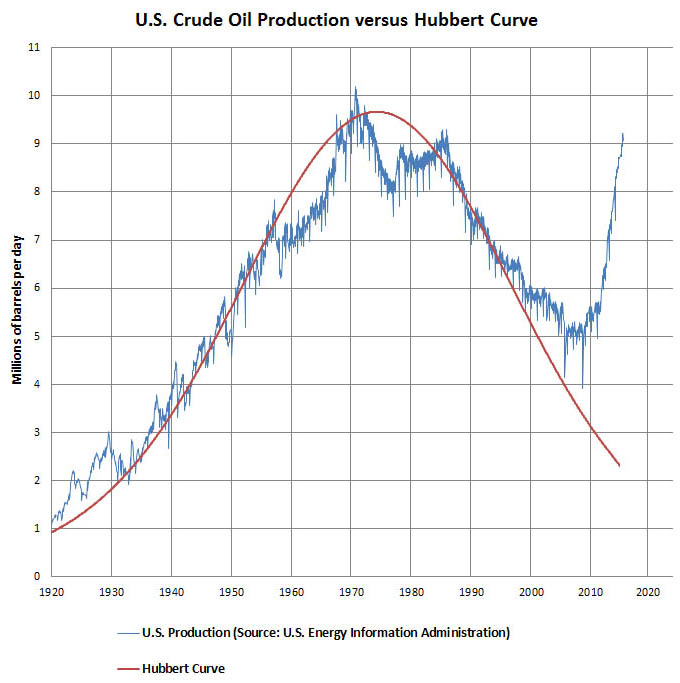
Conventional oil production may have peaked in 2018, but don't tell anybody. Peak optimism has not yet been reached. Oil production wil rebound and may not reach peak until 2030 when it will have been used to be turned into wind generators, nuclear, zero-point energy, cold fusion, and solar PV will empower whomever. Oh, but if we have another 15 years to grow the economy, to get bigger, will there be some outcome other than falling harder?
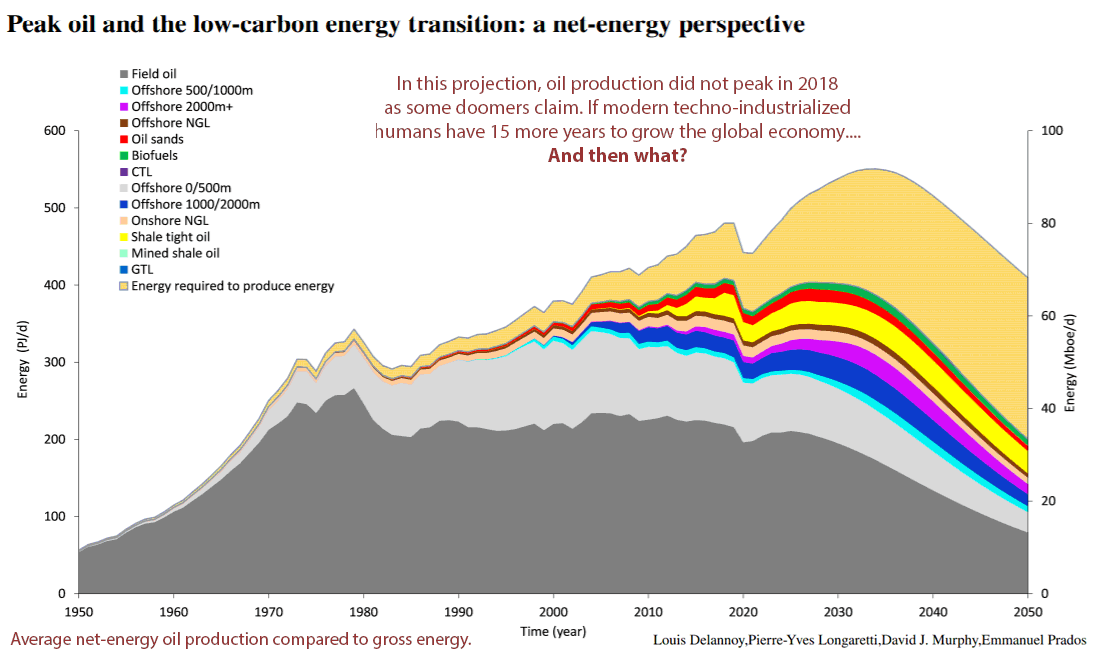
Somewhere around 2020 could be "peak fracking" in the USA. To update the above, consider:
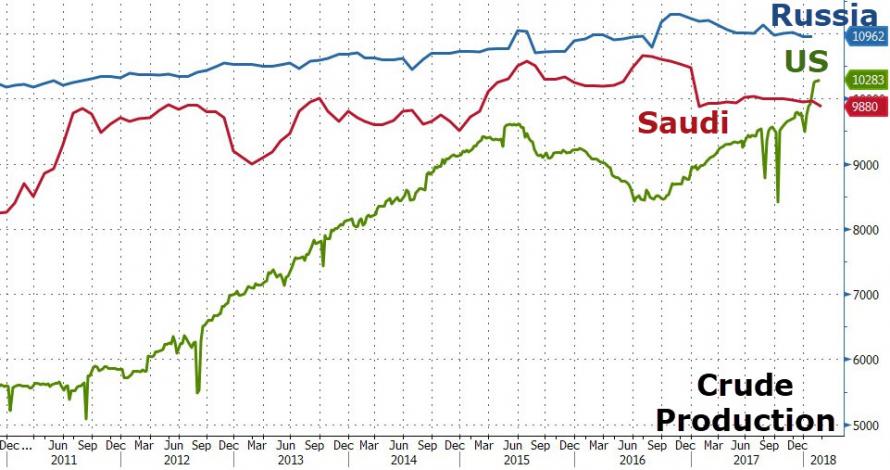
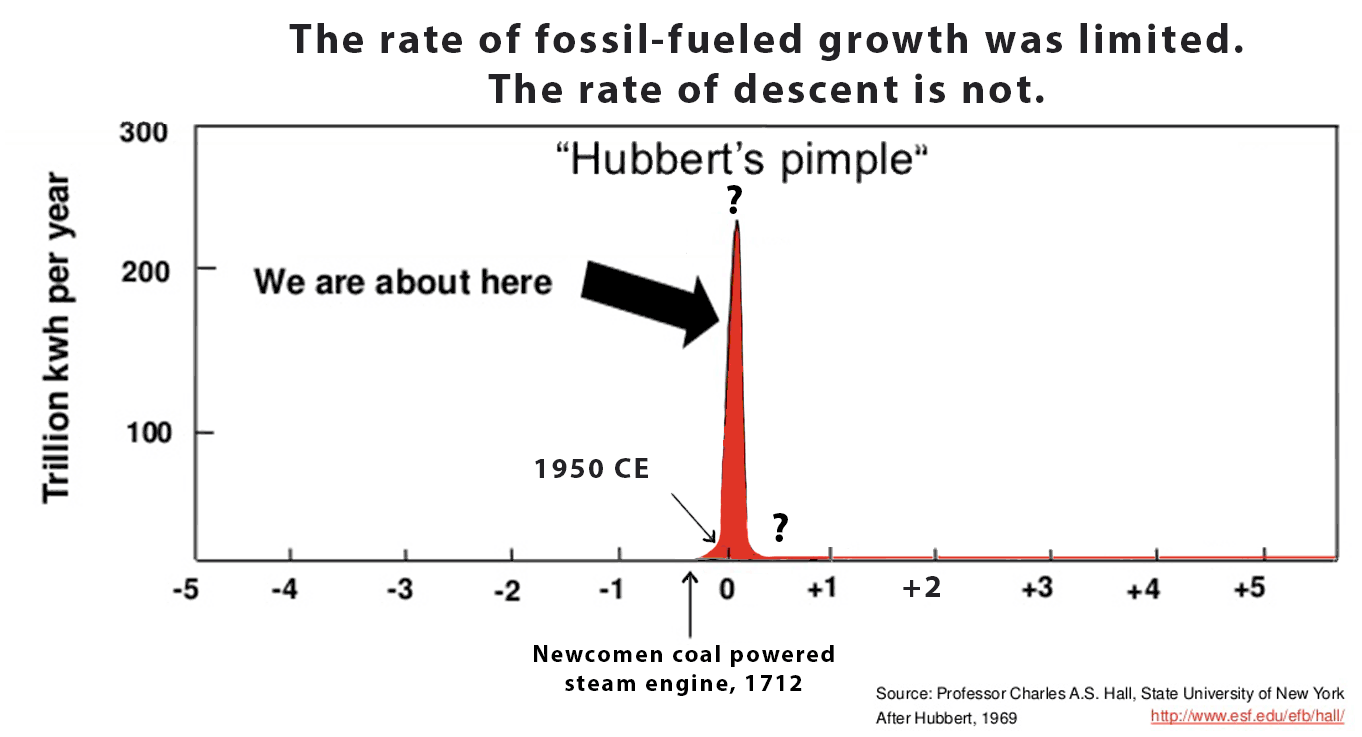
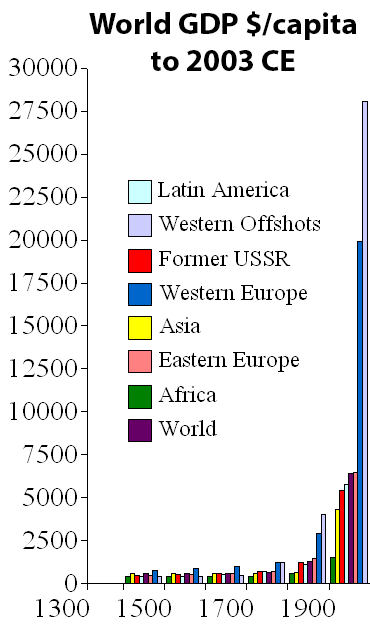 Assuming the way up was maximized, note that the way down need not be symmetrical. The way up lasted three hundred years. The way down could be three, thirty or three hundred as the rate of degrowth can be rapid. Indeed, per Seneca, the way to ruin may well be rapid as there are no biophysical limits to the rate of descent.
Assuming the way up was maximized, note that the way down need not be symmetrical. The way up lasted three hundred years. The way down could be three, thirty or three hundred as the rate of degrowth can be rapid. Indeed, per Seneca, the way to ruin may well be rapid as there are no biophysical limits to the rate of descent.We are on the up side of a pulse that will climax. Exactly when will only be clear some time after the fact when denial can no longer be sustained..
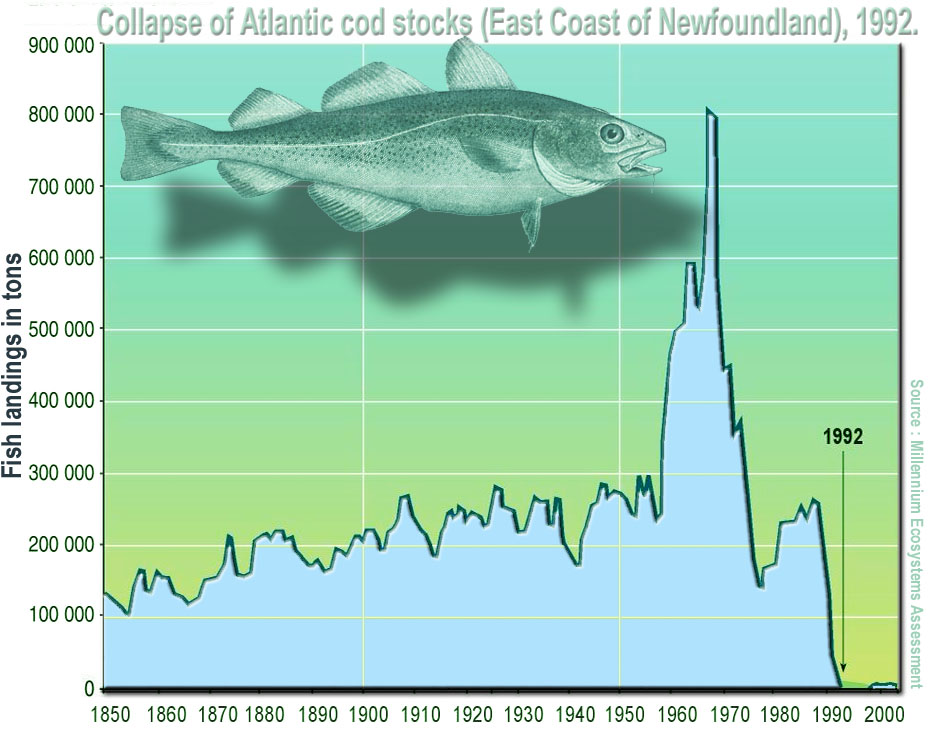
The number of farms (and farmers) has declined with the rise of corporate fossil-fueled agribusiness. Farm size decreased after the plantations lost their slave labor, then increased as energy slaves were developed. Less than 9% of "farms" produce 63% of agricultural products in the USA. On average, each bite of food an American eats has traveled 1,500 miles (2400 km). This can be expected to change.
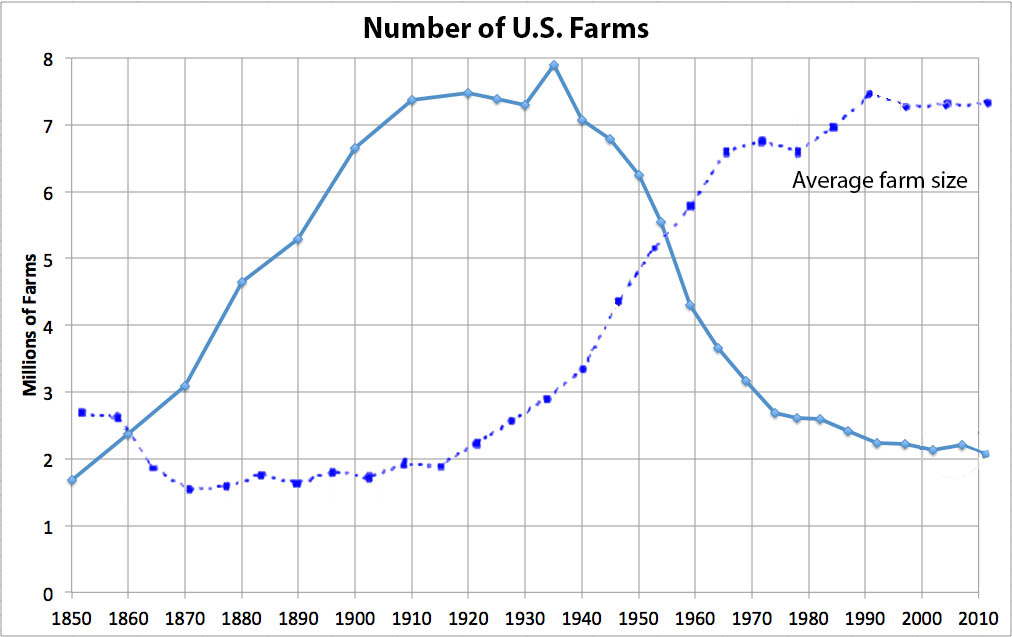
Some oversellers of alternative food production ways and means may think that unleashing an army of permaculturally trained master gardeners will increase agricultural productivity, but the oversold should know what they are buying into. We will go back to natural, "organic," pre-industrial methods and develop a few new ones, but yields will not increase nor equal the amount of industrially produced foods 90% made out of fossil fuel energy inputs.
The Hopi have been engaged in sustainable corn farming for 1,300 years. The Puebloans, dependent on rainfall in a semi-arid region with 10 inches of rain per year, harvested about 4 bushels of corn per acre along with squash and beans. Early Midwest American farmers in areas allowing dryland farming because of favorable rainfall, got 26 bu/ac. This level of productivity was likely unsustainable because newly cleared land is subject to soil mining and excess erosion, the over extraction of soil fertility by repeated cropping. So how are Midwest farmers getting 150 bu/ac today? Do they just know so much more? Well, they know how to turn fossil fuel inputs into corn. Without fossil fuels, figure planting a field once every three to fifteen years (or leave fallow longer depending on soil and cover crop) and expect a sustainable yield of 20 bushels per acre, which will have to feed the farm animals and farmers with some left over for some city folks too.
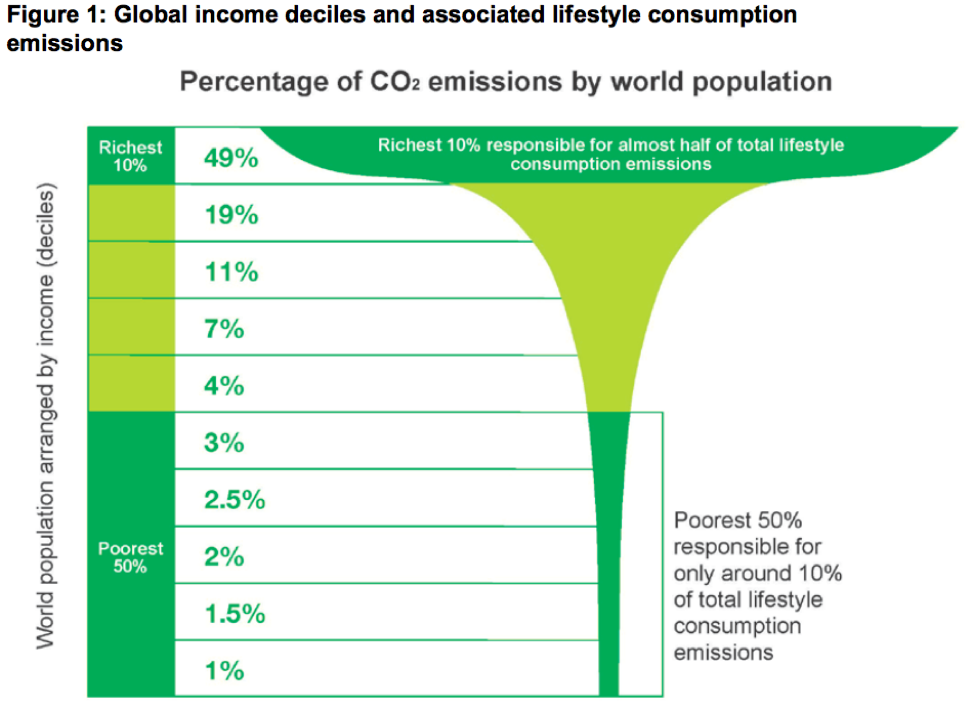
Americans, and others prospering in industrialized regions visible at night, are the richest of the rich.
Such has been the way up. We've been there, done that, and to some degree the way up has been prosperous for (almost) all humans (but not so much for most other organisms). North Americans, Europeans, Japanese, and Australians, who make up 20 per cent of the world's population, are consuming more than 80 per cent of the world's resources. Never have the rich gotten richer (rich: they who can afford to have machines or other humans wash their clothes). Still, pre-transition, those making a dollar a day have hopes of making two dollars a day. Those who can buy a pair of shoes this year can still hope for a bicycle in the distant future, and those who have a bicycle can still hope for a motor scooter and then a car. When the global economy transitions to negative growth, those making a dollar a day will merely give up hopes for a bicycle and make their own shoes (they or their parents probably know how), and others will hope to keep their bicycle in good repair.
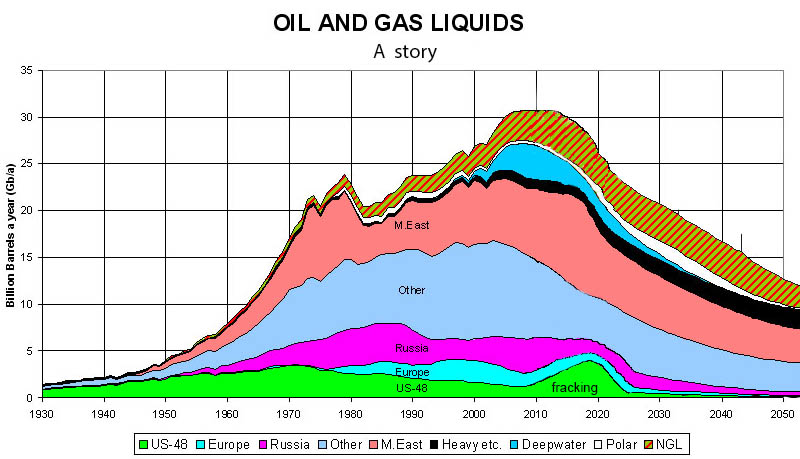
The above is for oil and natural gas. Coal will take a few decades longer to burn up. Perhaps before then remaining coal will just spontaneously burn itself thanks to global warming. As oil and gas dwindle, will the rich be oversold on renewable energy? Will dirty coal be used to placate their concerns? Will they feel good about putting solar panels on their roof?
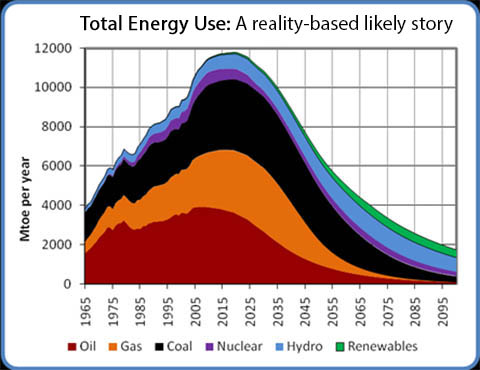 |
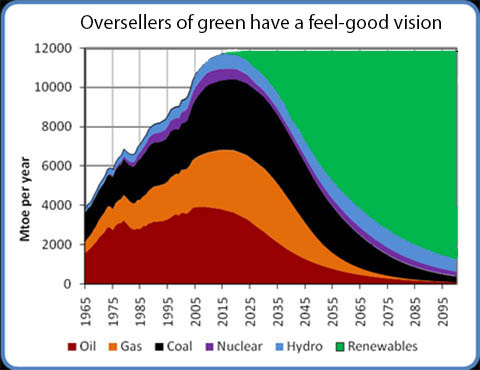
People would rather feel-good believe than know. |
Will a few solar panels be better than no electricity? Yes. Could solar PV be used to make more PV? Unknown. To the extent that alternative energy is net positive, will it fuel growth? No. Will it meet basic human needs? Some.
The 1972 "Limits to Growth" was assumed by those who didn't read it to predict apocalypse soon,
and since it didn't happen, the book's thesis was dismissible. I read
it and recall getting the impression, based on evidence and reasoning
presented, that the most likely story would be that hard limits would be
reached by 2070, with 2030 to 2070 being a likely range. It hasn't
happened yet, but neither has 2070. The thesis was that there are limits to growth.
There were many possible futures but limitless growth is not one of
them. One possible future, foreseeable in 1972, may yet to be. If not,
it will be one like it.
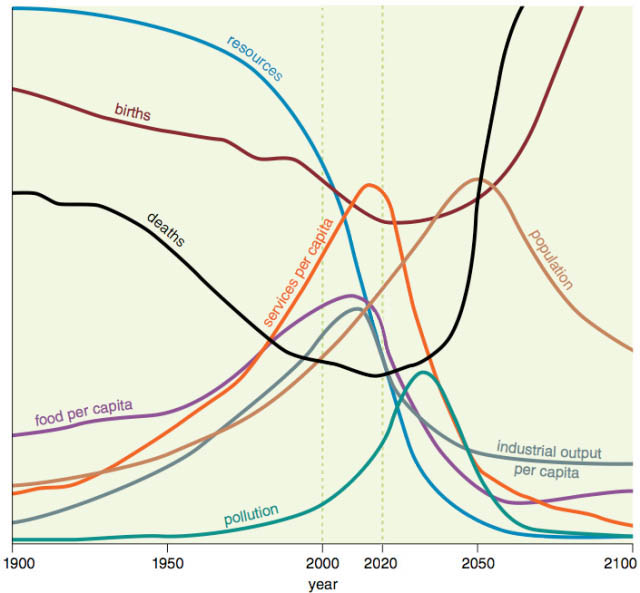
or maybe
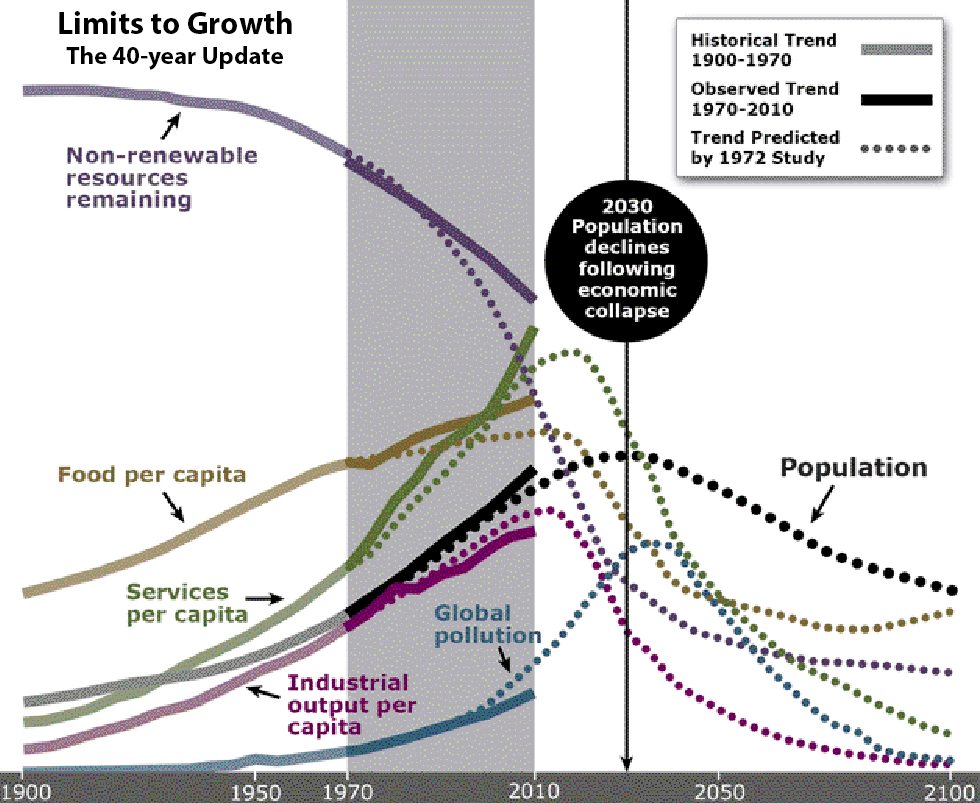
The take home message of the book was missed by most then and still is. The effort to misunderstand and demonize the message is telling.
For the dollar-a-dayers the transition will be easy. For everyone else, in proportion to monetary income, not so easy. Not that there will ever be a shortage of money, just a shortage of real wealth to exchange for it and a longage of demand. Those who grow subsistence crops for family consumption and occasionally sell a trinket to a tourist to buy a Coke when in town will barely notice the transition or the passing of tourists. The aisle walkers of Wal-Mart will notice.
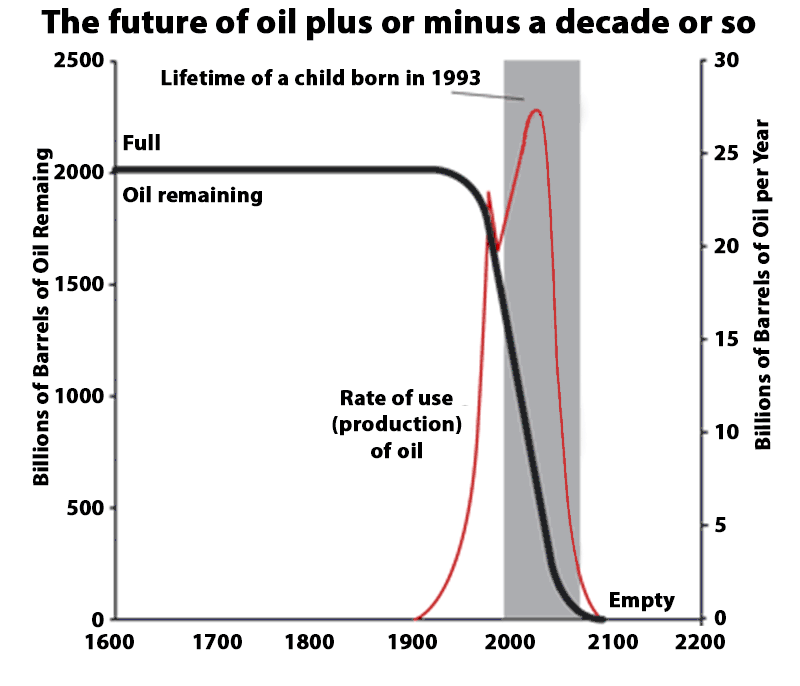
The belief that economic growth can and will keep on keeping on without limit will falter again. This time, however, there will be biophysical limits preventing ‘full recovery’ or any return to growth as usual for any significant period of time. Business as usual will falter and some humans may consider not hitting the wall of biophysical limits full speed ahead. Some may consider transitioning to an ecolate civilization. Design for a Viable Civilization
The EuroSino Empire's raise and fall may resemble that of the Roman Empire in that climax will be followed by decades of clever ape endeavor to keep on keeping on until collapse. Alternative would be embracing descent, degrowth, and managing it to avoid collapse. Managed descent could, after enough degrowth to be well within environmental productivity, transition to a steady-state biophysical economy, i.e. industrialized humans could have a prosperous way down.
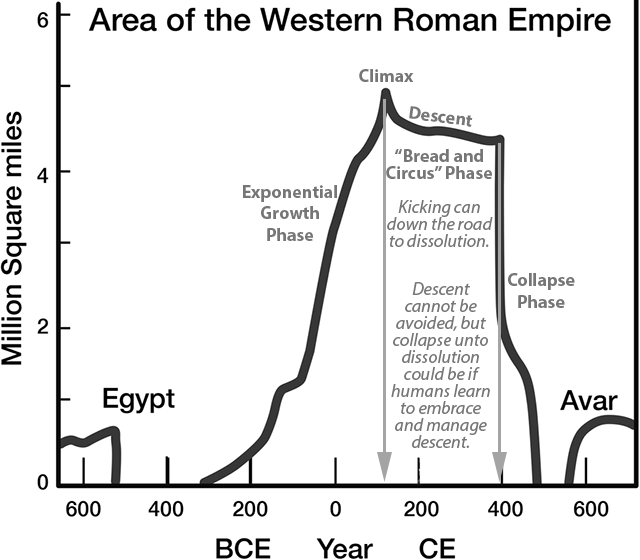
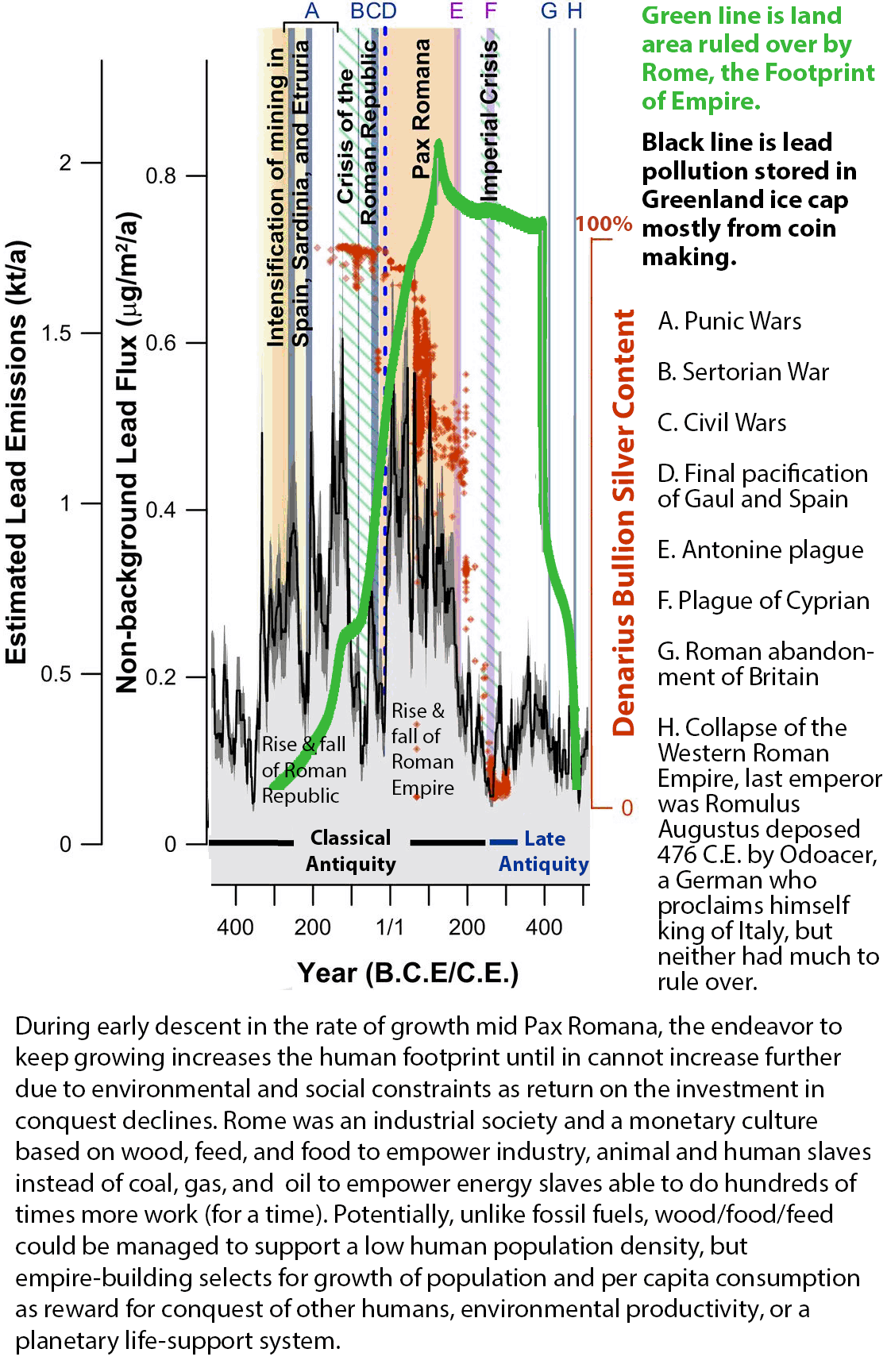
The transition will occasion a rethinking of "prosperous," and early adapters can get a head start. The way down can indeed be prosperous, but only for ex-hyper-consumers who redefine their vision of prosperity. "A man is rich in proportion to the number of things which he can afford to let alone." — Thoreau.
Those who think a person is rich in proportion to the size of their home and the amount of stuff filling it (and its garage and outbuildings) will have a less prosperous future. Those who, insofar as they need concern themselves with material things, think that prosperity is having enough will be able to thrive. "He who knows that enough is enough will always have enough." — Laozi
He who knows when enough is enough will not overshoot and always have enough. Wealth as 'more and more' was an easy sell that merely required a shameless pandering to dreams of avarice. But that too shall pass away.
Let's just boil the transition down to a to-do list:
- Focus on the welfare of the community that would have you as a member and on that of other local communities within your watershed.
- Note the machinations of increasingly irrelevant corporate nation-states as they pass away, but withdraw from them.
- Know what is right by the part it plays in the functioning of your life-support system (ecosystem).
- Do unto the planet as best benefits all members of the system that envelopes it.
- Judge value by the energies spent, stored and used in good service, turning not to the incomplete measure of money.
- Avoid cultivating dependence on high power—embrace the Power of Enough.
- Realize the melee of exuberant growth has a bad end, that descent to sustainable prosperity is good.
- Know that prosperity is having enough—know your wants from your needs.
- Value stability over growth, cooperation over competition, diversity over uniformity, system over self, and what-is over individual preference.
- Think of the seventh generation; do not be posterity-blind.
- Set limits and live by them; especially limit the human footprint on the planet.
- Prioritize preserving global information systems.
- Listen to microscopists and macroscopists to both focus and encompass.
- Minimize social inequality.
- Produce all fresh food and dry foods locally if possible.
- Produce needed items locally using a minimum of imported components (open source Userware model).
- Form circles of abelief based on free inquiry.
- Base interwatershed trade on equitable emergy evaluations (emdollars).
- Transition form economies to eco-nomies.
- Use AI assistance to help make up for human intellectual deficits (e.g. climate models are AI).
- Allow anyone, using reason and evidence, to challenge Gog.
- Place the "common interest" above "human interest" to protect the planetary commons.
- Encourage individual, family, and community urban micro-farms.
- Favor tiny modular one room mobile houses (Rolling Rooms).
- Replace arms races/acquisitiveness with arms reduction—from handguns to thermonuclear weapons.
- Replace territorial military-industrial complexes with a shared global military force that serves to counter interwatershed aggression.
- Share, preserve and add to information, know-how and designs without proprietary claims.
- Favor open source endeavors over proprietary ones.
- Replace resource exploitation (economy) with shared environmental mutualism (eco-nomy).
- Place a ceiling on personal income (set a maximum wage).
- Require unearned income to be donated.
- Tax consumption of wants rather than income.
- Preserve individual mobility—the vote-with-your-feet option.
- Provide employment through public works programs (a living minimum wage).
- Distribute necessities via a rationing system by issuing non-transferable coupons (pons) instead of money.
- Eliminate early retirement and encourage part-time work for elders, especially in education.
- Provide social security and a universal public baseline health care system.
- Put community needs before individual wants.
- Participate in the global democratic meritocracy (Federation).
- Develop a post-car culture valuing low-power transportation options.
- Strive for efficiency rather than speed.
- Treasure genetic and cultural diversity (information).
- Develop smarter machines, not more powerful energy consuming ones.
- Provide citizens a minimum living livelihood.
- Realize overpopulation (people, pets, livestock) is ultimately a local issue, not a global one.
- Reduce local population in a humanitarian way via attrition and birth pons until supported by low-intensity agriculture.
- Remove all incentives, dogma, and approval for excess reproduction of people, pets, or livestock.
- Limit livestock to available farm produce (weeds, insects, food rejects and waste) not consumed directly by humans.
- Reduce salaries and wages as necessary to maintain full employment.
- Eliminate all forms of in-your-face advertising.
- Mandate all media be ad free (e.g. Wiki sites, PBS) and prohibit commercial media ownership (internet, airwaves....the Info Ether).
- Provide belief therapy for those suffering from fixed conclusions.
- Maximize public/planetary benefit instead of maximizing monetary profit to individuals/corporations.
- Stop pumping groundwaters; restore wetlands and riparian areas.
- When dams silt in allow them to become waterfalls or remove them.
- Harvest and collect rainwater for all water needs, including irrigation.
- Celebrate rainy days as holidays.
- Operate low-intensity aquaculture ponds and constructed wetlands.
- Replant forests and rebuild soils.
- Restore reefs, eliminate jetties, and remove or set levees back from rivers or shore.
- Provide educational facilities for self-paced, self-directed learning with assistance as needed.
- Teach children how to think, inquire, figure things out, and not what to think.
- Provide educational daycare for small children.
- Keep education facilities for young humans open through normal adult working hours and open to all at other times.
- Devote public works programs to assist environmental restoration over the coming millennia.
- Find glory in being an agent of the Earth.
Note: So far as I know I've never had an original thought and every sentence should be referenced, meaning every phrase is plagiarized—I just don't know from where. I suppose I could google every phrase and annotate them, but that would be tedious for all. Some bits and pieces I do know where they came from. I recently wrote "some of those who chose descent into maelström" which is appropriated from an Edgar Allan Poe story. Then there is the image above. Click on it and go to the site I stole it from with minor modifications (I'm a Kopimist since what appears proprietary and original is an illusion and the only honest thing we can say of acts of creation is that "it came to me"). At least if I steal an image I host it and don't just link to it.
The title is a tweaked version of the Odum's "A Prosperous Way Down" from which a number of to-dos were copied. I happened to read H.T. Odum's "Environment, Power, and Society" when it was a new book back in the early 1970's. In ways too complex to follow, my every thought since has been to some extent shaped by Odum's grasp of reality (and that of others). To say the course of my life was altered may be understatement.
In science it is not uncommon that those responsible for paradigm shifts are overlooked by many and most during their lifetime. I consider Odum to be as requisite to understanding the biosphere/life as Kepler was to understanding the solar system. To summarize Odum in three words I'd go with "system over self," and, yes, that is a paradigm shift from business-as-usual thinking and it leads to other shifts.
I have no grasp of "self" apart from "system" within which we selves are embedded. We have neither a truly separate nor individuated existence and our star stuff will reenter the system as a water drop in a waterfall will reenter the stream (every phrase of this sentence is plagiarized and I'm not going to cite sources, though I could). The better part of "my" DNA I share with a cabbage. Any grasp of things to come is best based on what-is and what has been insofar as we humans can best discern. Without a little help from Odum and ilk we may have no better chance to prosper than of flying to the moon by relying on Cyrano de Bergerac without Kepler. Compared to going to the moon, getting through the 21st century and emerging prosperous may be more challenging. Odum was one of the earliest and best macroscopists. More are needed.
PS to PWD: The human predicament (the problématique): Everyone will prefer a prosperous way down to chaotic collapse that comes down to some sort of "zombie apocalypse" scenario as usual. Before descent, however, essentially no one will even consider the possibility that the way up will climax and descent will come (per definition and fact of overshoot). As James Schlesinger notes, "People have only two modes of operation: complacency and panic" and virtually all are now firmly in complacency mode (for an unsustainable period of time to come) including those in the Transition Movement or who have recently been arrested at an Extinction Rebellion happening. Panic will be ineffective as usual. Only foresight intelligence and the ability to rather know than believe enables one to bypass denial and the denialism that enables complacency. Mary Odum tried to "spread the word" and started a Facebook page in 2014. In 2019 it had 50 "Likes." Hu-mans seem to "Like" delusional narratives best of all. So, maybe Facebook won't save the world [or maybe it will.].
The Prosperous Way Down
May 10, 2014 ·
What do we mean by a prosperous way down? Most economies in our current civilization have experienced over a century of rapid growth due to surplus energy inputs in the form of fossil fuels. As a result, our worldview magnifies our impression of our exceptional capabilities to develop technology and grow our economy without limits, through use of power. This worldview diminishes the role of nature in supporting us, replacing that role with high quality fossil fuels. For over a century, this worldview has been unchallenged, especially in economies that use a lot of fossil fuels such as the United States. Viewing the world through an energy lens at the largest scale, or macroscope can help clarify the nature of power, formalizing its role, and unifying principles about energy with observational data from the real world about systems to explain a coherent worldview. Discoveries about ecological systems provide new insights and principles that can be extrapolated to how economic systems work. General systems principles can be used to recommend changes in public policy.HT Odum’s science of Emergy Synthesis is the basis for our thinking about the prosperous way down (PWD). Emergy synthesis is a biophysical approach to measuring human activities that considers the indirect and direct contributions of ecological processes using equivalents of solar energy rather than monetary metrics to consider differences in quality of energy. It approaches valuation from a donor-based or supply side independent of the more usual economic demand-based approach that is dependent on subjective values of willingness to pay. PWD advocates propose that policy decisions can be more deliberate by basing the decisions on quantitative Emergy Evaluation/Synthesis.
The 2020 Addendum
Start with a Reality 101 update:
'...our species is nearing the peak of a fossil-fueled ~200 year plague-like population outbreak that is beginning to trigger serious manifestations of negative feedback... half the fossil fuels ever used were burned in just the past 30 years (90% has been consumed since 1943)... the time has come to face biophysical reality.... the human population will decline dramatically; theoretically, we can choose between a chaotic collapse imposed by nature or international cooperation to plan a managed, equitable contraction [by design, emphasis added] of the human [BAU] enterprise.... The question is: how can the self-proclaimed most-intelligent-species-on-Earth organize socially, politically, and economically to implement a process to ensure an orderly and equitable contraction? Could there be a more riveting intellectual and practical challenge?' —William Rees, The fractal biology of plague and the future of civilization 2020.
So some, 'who can actually think more than a decade ahead' [E.O. Wilson] are starting to realize that they (and humanity) are at a 'choice point'. Will all humans keep on keeping on and collapse the system? Or will 'some' (how many?) be constrained by their 'better view' of how things work, by their ecolate understanding of the nature of things, to embrace descent and work to make as prosperous a way down as possible happen within pockets of sustainable and functional human complex society that may yet be possible to create by voting with their feet to be the majority in an area that will self-organize and maybe continue to evolve their species. Or not.
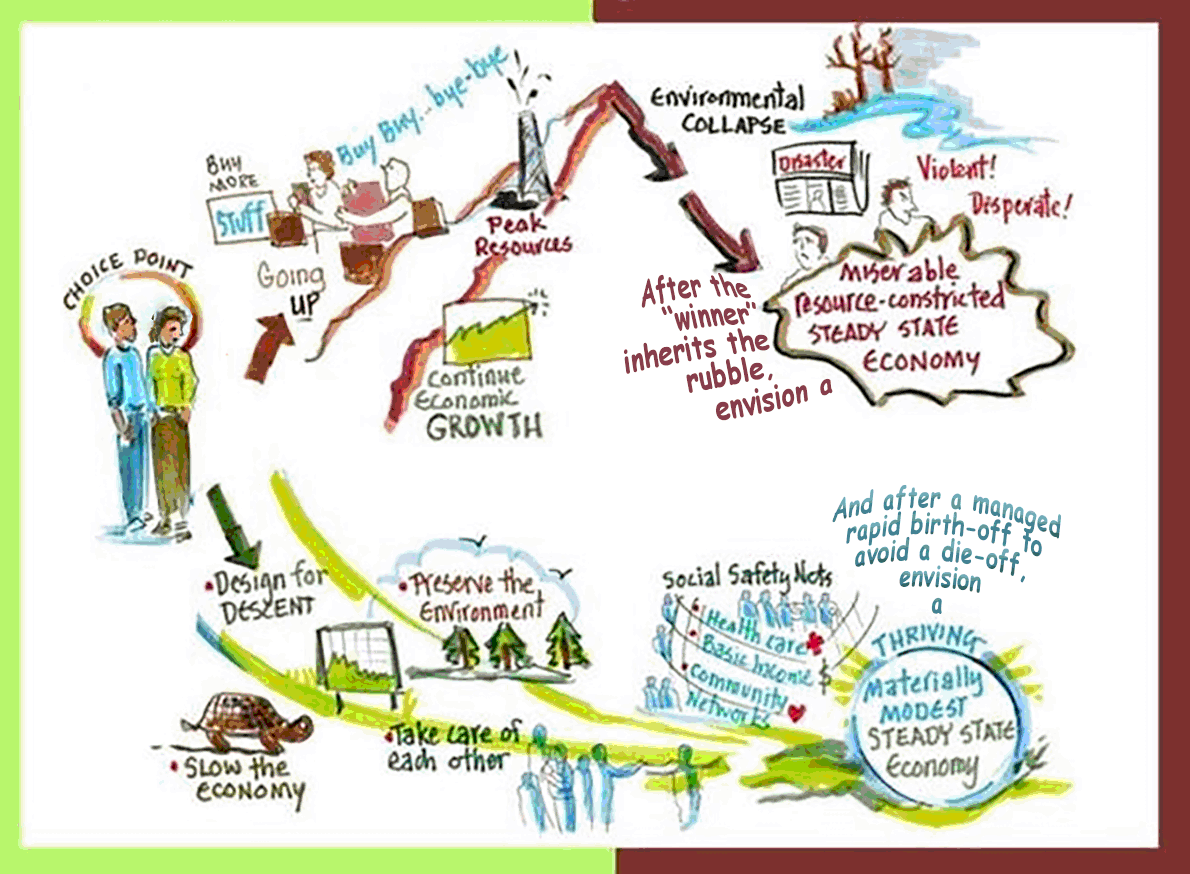
So let's consider facing biophysical reality. Human biology is. We are tribal animals. Since empire building began, male atavisms have been selected for, e.g. alpha male rule, patriarchy, and conquest of other humans and nature. Males of industrial society are more likely to look up towards more growth and prosperity, to believe in MORE!, HARDER!, FASTER!
Women are somewhat less posterity blind. They are more likely to think more than a decade ahead and make the better 'choice' that the better view determines. short-term self interest is what helps empire and the economy (conquest of nature) prosper (for a time). Our hubris and empire-building ways select for male atavisms that need to pass away. If we understand the nature of the alpha male and the growth dynamic, we will be delivered from him (or sometimes her) and his evermore. The better dynamic is: to understand something is to be delivered from it.
Our pathological dynamic began before agriculture enabled humans to form long-term settlements of more than 150 people. Societies larger than nomadic bands (typically 20-50 in number) select for hierarchy, for overdensity complex societies (and monument building) that are unsustainable, and for short-term empire building. Proto-polytheistic belief-based religion, e.g. at Gobekli Tepe and Stonehenge, that enabled early empires of belief lead by priests/priestesses to form, when the environmental game and grain harvest was abundant, large gatherings of otherwise nomadic hunter-gatherer-gardeners, who still normally lived in band sized groups, to build monuments and serve the elite religious law givers who orchestrated the monument building.to serve the elite religious law givers who orchestrated the monument building and the beginnings of complex society that selects for hierarchy.
Organized belief-based religion enabled super-tribalism, the formation of pseudo-tribal identity memes that allowed groups larger than Dunbar's number to form for the first time. Soon, political pseudo-tribal identity memes merged with the religious to enable a coalition of priests and warlords to rule ever more complex societies in a competitive dynamic of complexity building we still live in. For the first time in history there is one global monetary culture/empire that we (who know what money is and likely value it) are products of and serve (for a time).
'...our species is nearing the peak of a fossil-fueled ~200 year plague-like population outbreak...' Let's step back a few years, a mere tick of geological time, to 1819.
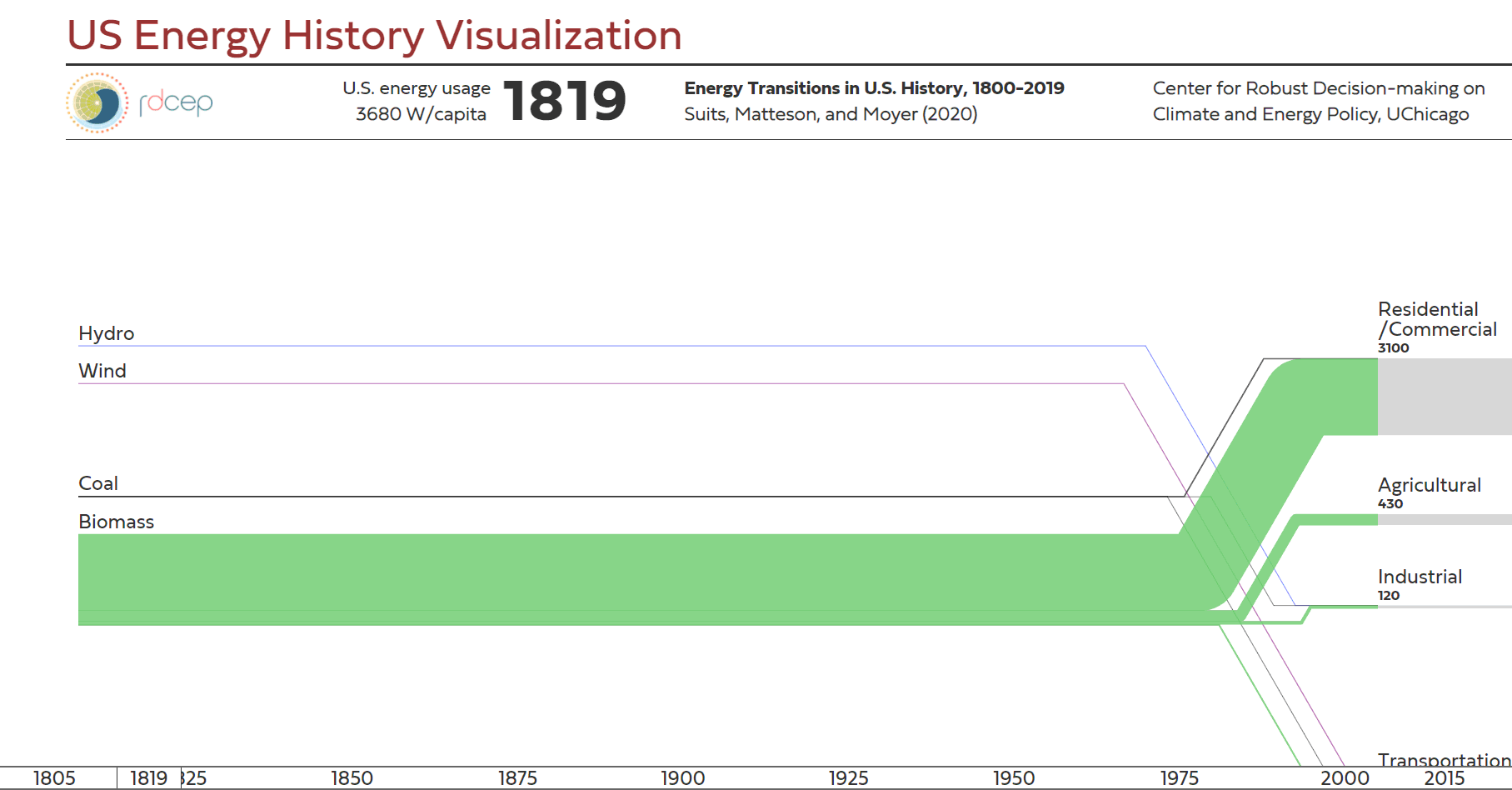
The course of empire building was passing from the Euro region, where the Industrial Revolution (consumption of fossil fuels) began about a hundred years earlier, when Newcomen invented his steam engine, in 1712, to pump water from flooding coal mines. By 1819 there were a few coal mines in America, but there was still a vast eastern forest for the taking and whales in the sea to provide lamp oil. There were no electric lights or significant production of electricity, yet humans prospered unto overshoot.
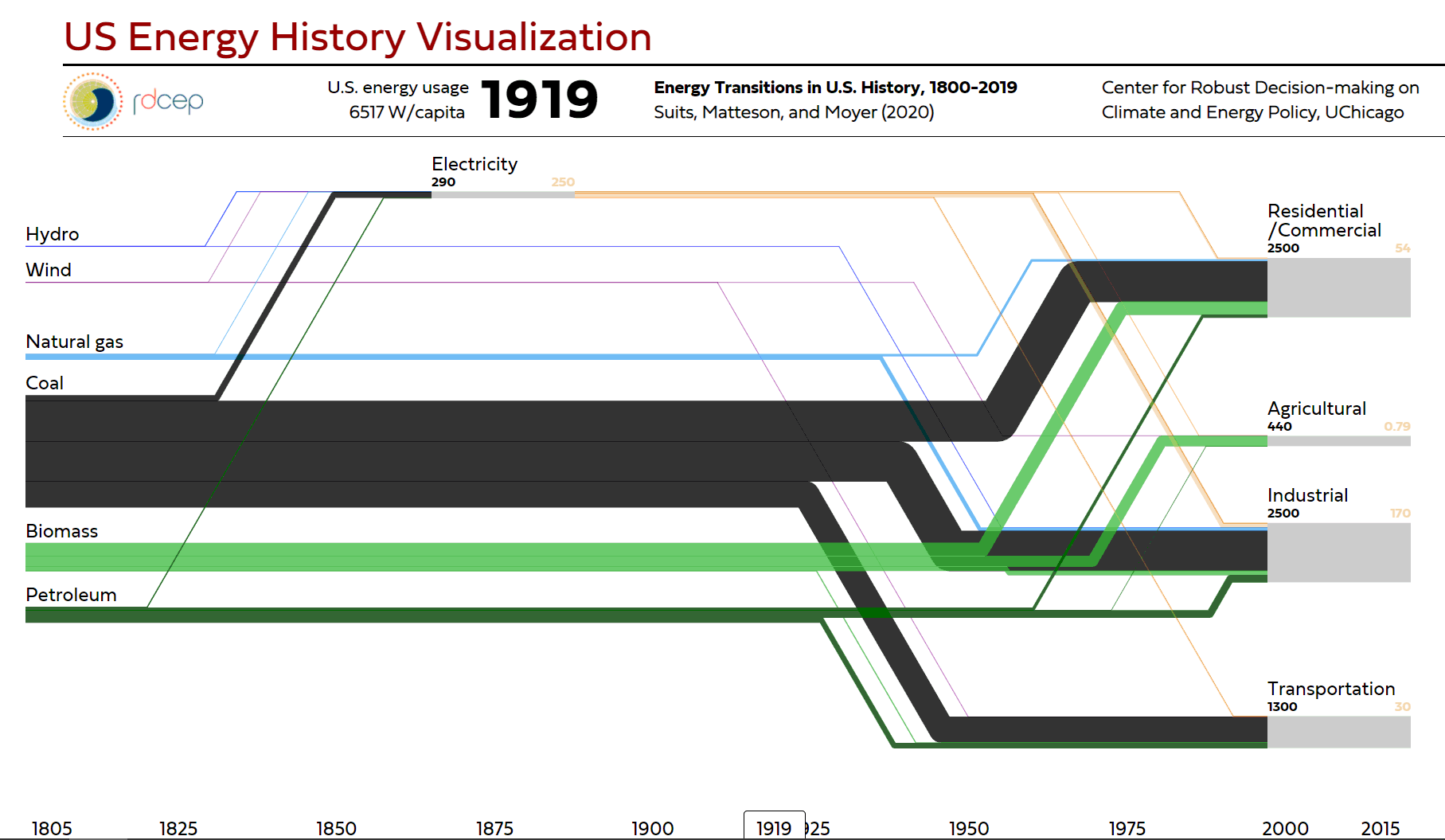
After the tick of 1819 became the tock of 1919, and Euro fossil-fueled power, economic and political, had shifted to North America, a sort of New World for the taking. For a time there was the Euro-Americo Empire colonizing the remainder of the planet for the taking.
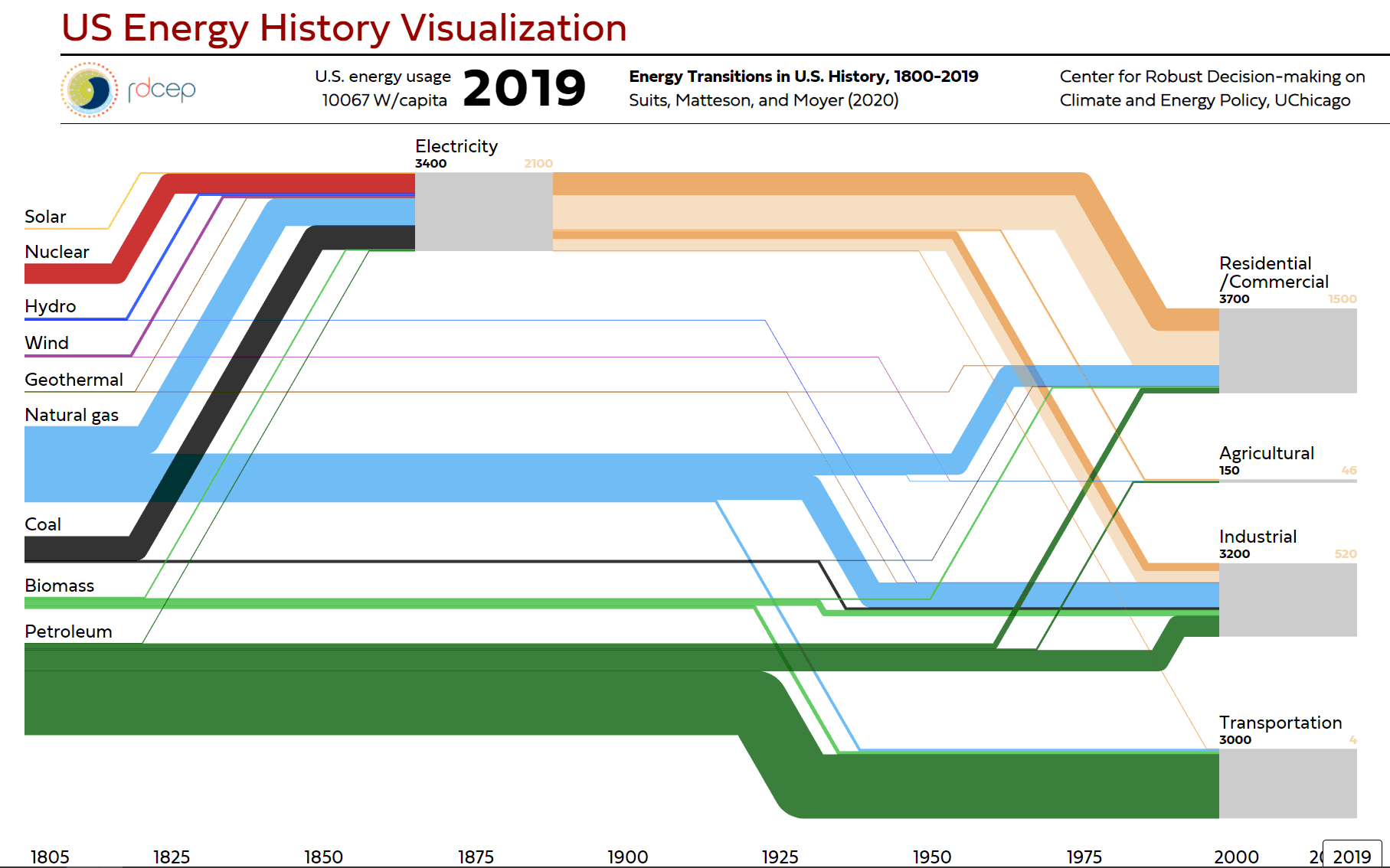
So back to the future's past, our present. Growth has shifted again further west to the Sino region where it will climax. For a time we are still prospering, though per capita energy consumption (aka real wealth) has peaked. Per capita electric consumption peaked in 2007. So whether we of the global Euro-Sino Empire are near, at, or just over the climax of our system is not yet clear as absolute growth still continues (especially in China).
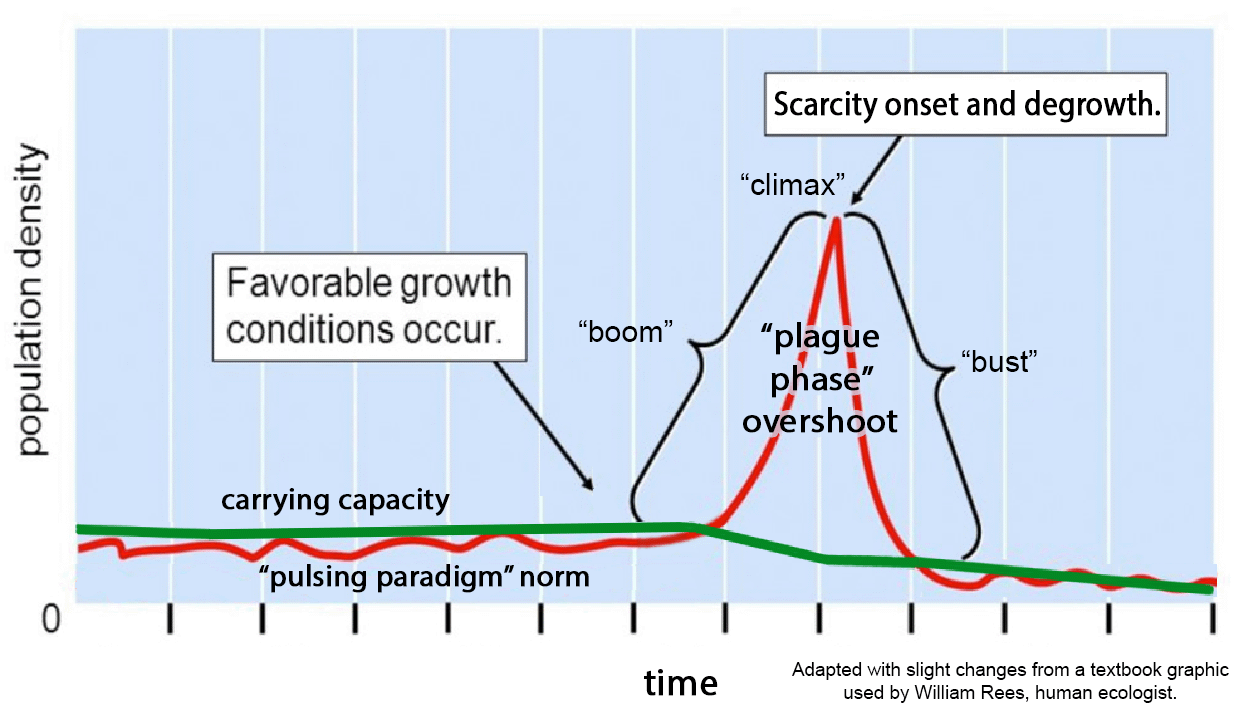
Back to our 'choice point'. How many are ready, based on an understanding of the remorseless dynamic we are trapped in and serve, to form pockets of possibly sustainable complex society by design, i.e. abandon their BAU lives and 'vote with their feet' to help create a viable ecolate civilization? Let's say, as Pollyannas, some fraction of one percent of the global human population do. Is that enough? We don't know, but there is a potential fork in the road.

What is your future? Will it have something to do with the future of humanity? Will posterity thank you? What possible futures do we have? Could we clothed apes be extinct in one hundred years? Will we colonize space and start to build our Dyson sphere in one hundred years? Should you ask an expert? Or, as Richard Feynman suggested, should you believe only 'in the ignorance of experts'?
'The question is: how can the self-proclaimed most-intelligent-species-on-Earth organize socially, politically, and economically to implement a process to ensure an orderly and equitable contraction? Could there be a more riveting intellectual and practical challenge?'
Do we have another hundred years to figure out whether we go extinct, preside over the greatest mass extinction since the Permian, or both? Or maybe there will come 'a human on the planet that really does understand it and can live with it properly'? —James Lovelock.
I could say 'you decide', but that would be double-plus ungood. I'll repeat Ludwig Wittgenstein: 'Understand or die.' If you understand this, then you'll have no choice but to endeavor to tell better stories, to just say no to the delusional stories of others.
There are some 22 thousand colleges and universities teaching conventional economic thinking. They matriculate about 100,000 PhDs in NCE certitudes each year. They will assure you not to worry. Clever apes will find solutions, they always have, and it is substitutions all the way down. We have been decoupling and will decouple from nature, from all mere externalities. If there is a shortage of energy to grow the economy, the economy will produce more. You can bank on it. Why listen to doomers?
 If you went to 12th century Oxford, you'd get a different story, one of God's Mandate instead of Growth's Mandate. Don't listen to doomers or cornucopians or any belief-based sources. Listen to Nature who has all the answers, who alone determines what works and who persists. About all we bitches can do is guess then test. What we do in the next hundred years will matter to posterity. Nature doesn't care, however. 'Nature is unkind.'
If you went to 12th century Oxford, you'd get a different story, one of God's Mandate instead of Growth's Mandate. Don't listen to doomers or cornucopians or any belief-based sources. Listen to Nature who has all the answers, who alone determines what works and who persists. About all we bitches can do is guess then test. What we do in the next hundred years will matter to posterity. Nature doesn't care, however. 'Nature is unkind.'
Some could take the path less traveled by, but will they be enough? Posterity only knows.
Envision US energy use in 2119. Assume there will still be ever decreasing EROI coal left that we shouldn't burn, and that the extended EROI/EYR of oil/gas has fallen off the exergy cliff. And assume the thin blue line at top of hydro is still working, but as the last wind turbine was made in 2084, that there is hope of keeping a few working at the Wind Museum in Texas.
And as many hope, assume the last nuclear power plant has been decommissioned as best as can be, sort of, to minimize the imagined glow at night. And go all eudaimonic and envision renewables as somehow having doubled, and despite the environmental degradation, there is still nearly as much biomass to burn to cook with (e.g. tightly wrapped bundles of grass) when the sun doesn't shine and you can't solar cook. Imagine somehow that poor people have 40Wh/day of electrical services and the uber rich have up to 60Wh/day.
In one possible future, oil and gas usage fades out mid-century as the energy return on energy invested becomes too low to allow continued production. The EROI of coal was low but coal reserves were larger, allowing continued production and a second coal age in an attempt to keep the all important electrical services going (to keep the ACs, refrigerators, and electric cars and hair dryers going), especially in cities utterly dependent on coal-fired electrical services and food imports.
In the twentieth century, post Wood Age, forests had begun to recover, but the demand for home heating in temperate areas and TP lead to widespread unsustainable woodcutting until there was ever less to cut. That some coal-based industrial production, and its monetary culture, continued into the 22nd century was mostly unforeseen by the true believers in the limits to growth.
 There had been the Great Global Depression, with some recovery thanks to a tripling of coal usage. It was followed by the Greater Depression that forced the Uber Rich industrial societies to try harder. WWIII helped the economy recover, but in early 2119 came the Greatest Depression. The financial system collapsed utterly and there was no recovery. Cities were abandoned (or rather depopulated), and with the passing of the Second Age of Coal, almost all economic activity (production and consumption) ended, including industrial agriculture. The Uber Culture and its longage of demand had finally passed away. Some (most of those who remained) thought the change was for the better.
There had been the Great Global Depression, with some recovery thanks to a tripling of coal usage. It was followed by the Greater Depression that forced the Uber Rich industrial societies to try harder. WWIII helped the economy recover, but in early 2119 came the Greatest Depression. The financial system collapsed utterly and there was no recovery. Cities were abandoned (or rather depopulated), and with the passing of the Second Age of Coal, almost all economic activity (production and consumption) ended, including industrial agriculture. The Uber Culture and its longage of demand had finally passed away. Some (most of those who remained) thought the change was for the better.
Electric production largely ended, but after several decades of biophysical recovery, the remnant population had 50Wh of electrical services to use each day on average (down from current 28,900Wh/person/day). It was judged enough because it was. The EOs who had voted with their feet remained (they had been called the ,'E.O. ones' by those of the monetary culture who viewed them as mindless followers of Wilson who demanded a Half Earth and a Great Birth-off to create a world where humans were no longer dominate, so they came to use the term too, but when asked said it stood for 'ecolate ones').
They had come to realize the value of seeking out the condition now that will come anyway. They came to live 'different' lives because the new rules of their game forced them to. But as less than one percent of humanity in the 21st century, they had realized they needed to vote with their feet to form pockets of sustainable society. When the Greatest Depression came in 2119, they barely noticed.
Some days were dark and dreary, as they always had been as the eons passed, but information had been preserved among the forager-farming communities that used no coal and few industrial products as had small pockets of industrial society around hydroelectric dams who preserved technical information. Belief therapy had liberated those who had voted with their feet from being had (possessed) by their beliefs.
Policy making and living the religious life remained, but political and religious beliefs, having come to be found only in old books, were gone with the wind. It had taken ten thousand years, but humans were again abelievers. They still told stories, but knew them to be as such. They arrived where we started, and knew the place for the first time. They listened to Nature... again.
Few could imagine living a more prosperous, eudaimonic life of love and understanding, and those who could were not believed, but regarded with bemused tolerance, as were alpha male wannabes while being redirected. Flowers bloomed, fruit ripened—how sweet it tastes!
A man encounters a tiger. Fleeing (the tiger after him) he comes to a precipice, takes hold of a wild vine and swings himself down over the edge. The tiger sniffs at him from above. The man sees a strawberry near him with blue sky above. The past is as remembered (a narrative); the future is as imagined (another story). How sweet the berry tastes as the vine and the man's hubris give way. There are no true stories.
Addendum 12-25-2020
I wrote of the Odums' prosperous way down over five years ago. I realized recently that my story of human development from hunter-gatherer nomads living in bands of typically 20-50 others all of whom they trusted with their lives, into technoindustrial humans who tend to trust no one (with the possible exception of the few they have frequent repeat interactions with) with their money or their lives, started with religious storytellers creating believing minds to enable the formation of memetic groups larger than Dunbar's number (that also severed personal short-term self interest and was also selected for) of still mostly nomadic bands to (after harvest time) gather to build monuments and create the first empires of belief, a dynamic new under the sun.
Within my SF short story above of our past to a near future of 2150, I mention religion, but I wish to now be more explicit. It is a 'telll the truth to power' and maybe save the world thing.
I realized that to tell the truth (as I have come to see it and of course I could be 'not even wrong') to power, I needed to go full apostate and criticize (i.e. rip out the still beating heart of) the empire-building monetary culture that spawned me. The New Atheists have been pulling their punches.
The 'Religions of Man' story is one of pathology, the first to have been normalized by We the People and our wordsmith servants (the title is that of Huston Smith's 1958 book, my first introduction to organized religious belief that he was later forced to rename 'The World Religions' to comply with the vagaries of changing wordsmithery, but the 'of Man' is more telling and so I'll repeat it).
We are not soon to be 8 billion angels. We are a plague species of nearly 8 billion socio-political-economic system serving humancentric pathogens and my conjecture is that religious belief, an invention of confabulating priests (perhaps more so than priestesses), was the starting point enabling of complex society as dissipative empire-building overcomplex structures that are not remotely sustainable (when combined with the certitudes of political economists) currently laying waste to a planetary life-support system.
'With or without religion, you would have good people doing good things and evil people doing evil things. But for good people to do evil things, that takes religion.' Sorry to say, but there is the ring of truth to Weinberg's observation, to which I can only add, 'and/or it takes politics'. Both are belief-based storytelling systems of putative verities inflicted on true believers, made so from birth, that enables humans to preside over the greatest mass extinction event since the late Cretaceous, one that may rival that of the Permian.
And I should be as mad as hell, but I'm not as there is no time for distractions or primate prattle. But I'm not going to take it anymore. Sorry if no one will Like or Share the obvious. I have to say what I see in front of my pug-nosed face.
I merely start with religious belief-based storytelling for chronological reasons to better understand the remorseless dynamic we are all captured by and serve. The foundational pathology is (my best guess) the believing mind, which includes all belief-based 'ways of knowing'. In 12th century Europe, recovering their empire-building ways post western Roman Empire collapse, religion served the raise of the feudal system with its narrative of the Divine Right of Kings (and aristocratic mutualists who could raise armed forces).
The shift of power from agriculture based wealth to a maritime mercantile system (one ship = one thousand old-growth oak trees that had grown back post Roman deforestation—James Burke) had more to do with money than indulgences and required different stories. Classical, then neoclassical economists told them. God's Mandate (Divine Right of Kings narrative) became Growth's Mandate, the story we, especially the 100k or so NCE PhDs that are minted each year (and even more political wannabes and 'thought leaders') tell. Their narratives are pretend science (and part of the sea of error, ignorance, and illusion we all swim in).
I used to be apolitical and areligious as I was more interested in Hubbert's matter-energy systems worldview (and Laozi, Zhuangzi, Sengcan, Zhen and fellow travelers for whom religion organizes nothing). I have, however, been forced to become anti-religious and anti-political as my understanding has come to view all belief-based storytelling (the belief in true stories) to be part of the human problematique and not any solutionatique.
With Dennett, I have come to not believe in belief, but to consider the possibility that the believing mind, the condition of being a true believer (Eric Hoffer), is the foundational existential threat to our species and all the others we pathogens are converting into humans, crops, livestock and pets as fast as possible. If such words make me seem anti-human, that is yet another illusion. A pox on all error, ignorance, and illusion we who fancy ourselves woke mistake for knowledge.
To understand the belief pathology is to be delivered from it (and all that it gives raise to, e.g. building empire and the monetary culture). Could it be that simple (if not easy)? Letting go of belief-based ways of deception to make room for inquiry unto death will change the dynamic (of the SYSTEM).
This is a testable claim. Subject all claims to the flames of an all consuming doubt, question everything, and beliefs settle like mud in a glass of muddy water that in not constantly sutured by endless prattle. Better to listen to the stars in their courses. Doing so may clarify the mind wonderfully. Perhaps we should try it.
If belief-based religion (as I've confessed, I'm a fideist with an interest in religious inquiry) was the start of something non-viable, maybe it would be a good place to start, with politics added in the next sentence.
So I now end my missive with this image that sums up my message to humankind in fewer words:

I don't know what God looks like, but if I had to imagine....
And, yes, if I were to add another sentence it would say something the legions of political ideologues infesting the planet, including environmentalists, wouldn't like. Maybe suggest they are part of the problem and not any real solution.
SUBNOTE TO FILE 11/17/2021
Climax may have come in 2018. Or there may be new peak, for a time. Either way, the way down cometh. Embracing degrowth with enthusiasm would minimize Malthusian deaths. But if told that continuing to keep on keeping on would make human extinction 99% likely, most would keep on keeping on until they can't. If 2018 was peak energy, I predict that by 2028 the consensus narrative of global 'thought leaders' will start to, if only in private, admit that maybe the future will be on the downslope. But surely, regional growth was still possible.
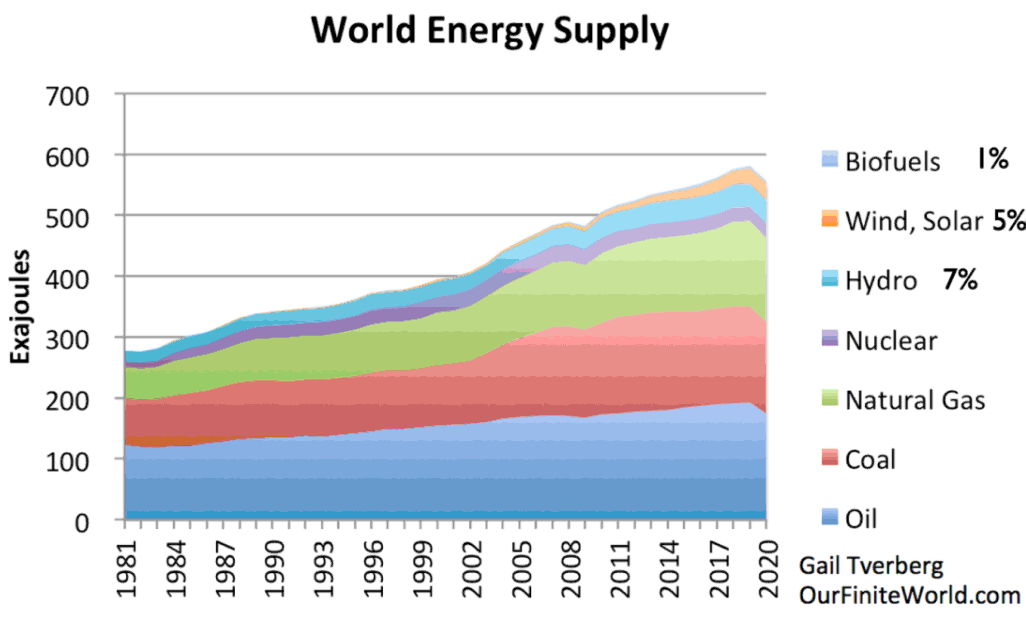
The economy is an energy, not a financial, system. The energy cost of energy (ECoE) has peaked in most regions, soon in China. Surplus energy is our 'prosperity'. Prosperity declineith. We haven't fallen off the energy cliff yet.
